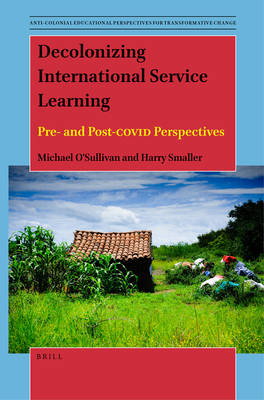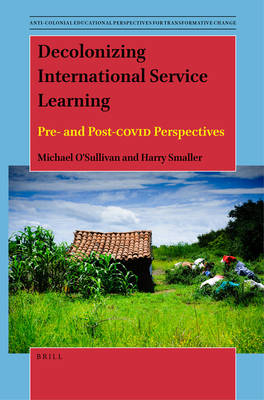
- Afhalen na 1 uur in een winkel met voorraad
- Gratis thuislevering in België vanaf € 30
- Ruim aanbod met 7 miljoen producten
- Afhalen na 1 uur in een winkel met voorraad
- Gratis thuislevering in België vanaf € 30
- Ruim aanbod met 7 miljoen producten
Zoeken
Decolonizing International Service Learning
Pre- And Post-Covid Perspectives
Michael O'Sullivan, Harry Smaller
€ 224,45
+ 448 punten
Uitvoering
Omschrijving
Despite the existence of a robust literature reviewed throughout this text which critiques salvationist models of international Service Learning (ISL), including literature that advocates deeply reciprocal relationships between global northern sending organizations and global southern host organizations, neocolonial models of ISL remain the dominant practice. The authors pose an ISL model that puts north/south reciprocity at the entre of ISL planning and implementation - based on their research and engagement in multiple ISL experiences and, importantly, from the input of representatives of global southern host organizations at a south-south gathering (encuentro).
This constitutes a rupture with the current model that views the host village as an extension of a group leader's classroom; rather, it makes the host community a space for difficult learning based on what hosts want their visitors to take home.
The interruptions of ISL travel represented by COVID constituted an opportunity to consider alternative models; despite the awareness of environmental impacts of travel, it is likely that ISL trips will resume. It is, therefore, increasingly important that the ISL experience becomes a means of generating solidarity rather than the reinforcement of neocolonial "helping imperatives" associated with the traditional model.
This constitutes a rupture with the current model that views the host village as an extension of a group leader's classroom; rather, it makes the host community a space for difficult learning based on what hosts want their visitors to take home.
The interruptions of ISL travel represented by COVID constituted an opportunity to consider alternative models; despite the awareness of environmental impacts of travel, it is likely that ISL trips will resume. It is, therefore, increasingly important that the ISL experience becomes a means of generating solidarity rather than the reinforcement of neocolonial "helping imperatives" associated with the traditional model.
Specificaties
Betrokkenen
- Auteur(s):
- Uitgeverij:
Inhoud
- Aantal bladzijden:
- 166
- Taal:
- Engels
- Reeks:
- Reeksnummer:
- nr. 13
Eigenschappen
- Productcode (EAN):
- 9789004547490
- Verschijningsdatum:
- 20/04/2023
- Uitvoering:
- Hardcover
- Formaat:
- Genaaid
- Afmetingen:
- 155 mm x 235 mm

Alleen bij Standaard Boekhandel
+ 448 punten op je klantenkaart van Standaard Boekhandel
Beoordelingen
We publiceren alleen reviews die voldoen aan de voorwaarden voor reviews. Bekijk onze voorwaarden voor reviews.








